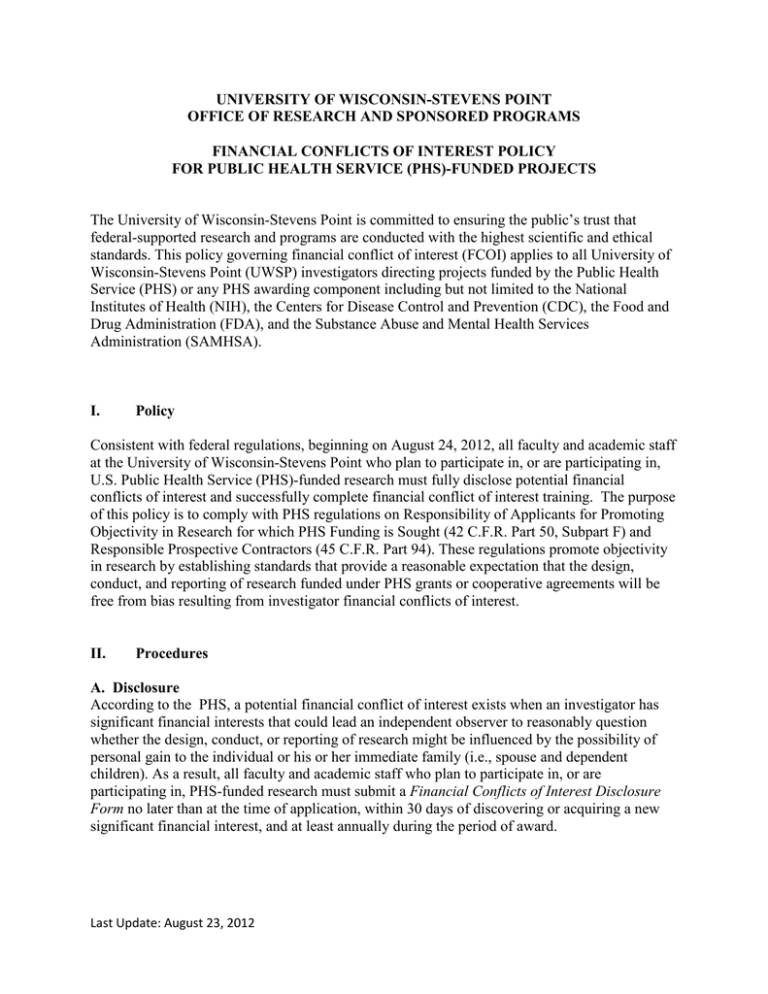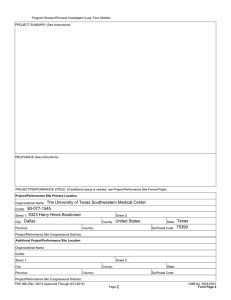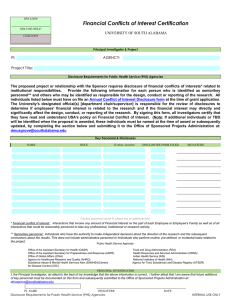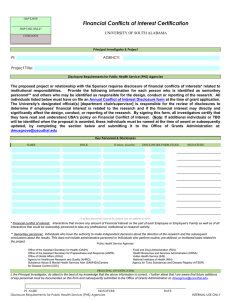UNIVERSITY OF WISCONSIN-STEVENS POINT OFFICE OF RESEARCH AND SPONSORED PROGRAMS
advertisement

UNIVERSITY OF WISCONSIN-STEVENS POINT OFFICE OF RESEARCH AND SPONSORED PROGRAMS FINANCIAL CONFLICTS OF INTEREST POLICY FOR PUBLIC HEALTH SERVICE (PHS)-FUNDED PROJECTS The University of Wisconsin-Stevens Point is committed to ensuring the public’s trust that federal-supported research and programs are conducted with the highest scientific and ethical standards. This policy governing financial conflict of interest (FCOI) applies to all University of Wisconsin-Stevens Point (UWSP) investigators directing projects funded by the Public Health Service (PHS) or any PHS awarding component including but not limited to the National Institutes of Health (NIH), the Centers for Disease Control and Prevention (CDC), the Food and Drug Administration (FDA), and the Substance Abuse and Mental Health Services Administration (SAMHSA). I. Policy Consistent with federal regulations, beginning on August 24, 2012, all faculty and academic staff at the University of Wisconsin-Stevens Point who plan to participate in, or are participating in, U.S. Public Health Service (PHS)-funded research must fully disclose potential financial conflicts of interest and successfully complete financial conflict of interest training. The purpose of this policy is to comply with PHS regulations on Responsibility of Applicants for Promoting Objectivity in Research for which PHS Funding is Sought (42 C.F.R. Part 50, Subpart F) and Responsible Prospective Contractors (45 C.F.R. Part 94). These regulations promote objectivity in research by establishing standards that provide a reasonable expectation that the design, conduct, and reporting of research funded under PHS grants or cooperative agreements will be free from bias resulting from investigator financial conflicts of interest. II. Procedures A. Disclosure According to the PHS, a potential financial conflict of interest exists when an investigator has significant financial interests that could lead an independent observer to reasonably question whether the design, conduct, or reporting of research might be influenced by the possibility of personal gain to the individual or his or her immediate family (i.e., spouse and dependent children). As a result, all faculty and academic staff who plan to participate in, or are participating in, PHS-funded research must submit a Financial Conflicts of Interest Disclosure Form no later than at the time of application, within 30 days of discovering or acquiring a new significant financial interest, and at least annually during the period of award. Last Update: August 23, 2012 All significant financial interests as defined in PHS Regulations must be reported (see definitions below). If you have questions about whether a particular financial interest should be reported, please contact the Office of Research and Sponsored Programs. • Financial Conflicts of Interest Disclosure Forms will be reviewed first by the investigator’s department Chair or equivalent, then by the appropriate Dean or equivalent, and finally by the Associate Vice Chancellor for Personnel, Budgets & Grants (AVC). When reviewing the forms, should a potential or actual conflict be identified, the AVC may convene an ad-hoc committee to explore the situation further. The committee will make a recommendation about whether the significant financial interest is related to the investigator’s institutional responsibilities, whether it relates to PHS-funded research, and whether it is a financial conflict of interest. If the committee concludes that a financial conflict of interest exists, they will also make recommendations for development and implementation of a management plan, including appropriate compliance monitoring. Deliberate misrepresentation of information provided on Financial Conflicts of Interest Disclosure Forms or failure to comply with the terms of this policy may result in sanctions, including discipline, loss of privilege to serve as an investigator on PHS-funded research projects, and dismissal. Instances of noncompliance trigger obligations for UW-Stevens Point to conduct a retrospective review of the research conducted during the period of noncompliance to ensure that it was not biased in its design, conduct, or reporting. If bias is found, the sponsor must be notified and a mitigation report submitted. Financial conflict of interest reports must be submitted annually thereafter. If the PHS determines that one of its funded clinical research projects whose purpose is to evaluate the safety or effectiveness of a drug, medical device or treatment has been designed, conducted or reported by an investigator with a financial conflict of interest that was not managed or reported by UW-Stevens Point, the investigator involved will be required to disclose the financial conflict of interest in each public presentation of the results of the research and to request an addendum to previously published presentations. Information concerning financial conflicts of interest held by investigators will be made accessible consistent with federal regulations. Records relating to all investigator disclosures of financial interests and UW-Stevens Point’s review of, or response to, such disclosures (whether or not a disclosure resulted in a financial conflict of interest determination), and all actions under UW-Stevens Point’s policy or retrospective review, if applicable, will be maintained for at least three years from the date the final expenditures report is submitted. B. Training The investigator is responsible for successfully completing financial conflict of interest training on the federal regulation, on disclosure responsibilities, and on this UW-Stevens Point policy prior to engaging in PHS-funded research and at least every four years thereafter. Investigators who come to UW-Stevens Point from other institutions must undergo UW-Stevens Point’s Last Update: August 23, 2012 training prior to the expenditure of funds on a PHS-funded research project. Should UW-Stevens Point find that an investigator is not in compliance with the policy or a financial conflict of interest management plan, retraining will be necessary. In the event UW-Stevens Point revises its financial conflict of interest policy and procedures in any manner that affects the requirements of investigators, retraining will be necessary. C. Treatment of Subcontractors, Sub-recipients, and Collaborators When UW-Stevens Point carries out a PHS-funded grant or cooperative agreement through subcontractors, sub-recipients or collaborators, UW-Stevens Point must take reasonable steps to ensure that the sub-recipient investigator is in compliance with federal regulations. UW-Stevens Point fulfills this requirement by setting forth the obligations of each party with respect to conflict of interest management and reporting in the agreement between the parties. III. Definitions The PHS regulations provide the following key definitions of terms. Disclosure of significant financial interests means an Investigator's disclosure of significant financial interests to an Institution. Financial conflict of interest (FCOI) means a significant financial interest that could directly and significantly affect the design, conduct, or reporting of PHS-funded research. FCOI report means an Institution's report of a financial conflict of interest to a PHS Awarding Component. Financial interest means anything of monetary value, whether or not the value is readily ascertainable. HHS means the United States Department of Health and Human Services, and any components of the Department to which the authority involved may be delegated. Institution means any domestic or foreign, public or private, entity or organization (excluding a Federal agency) that is applying for, or that receives, PHS research funding. Institutional responsibilities means an Investigator's professional responsibilities on behalf of the Institution, and as defined by the Institution in its policy on financial conflicts of interest, which may include for example: activities such as research, research consultation, teaching, professional practice, institutional committee memberships, and service on panels such as Institutional Review Boards or Data and Safety Monitoring Boards. Investigator means the project director or principal Investigator and any other person, regardless of title or position, who is responsible for the design, conduct, or reporting of research funded by Last Update: August 23, 2012 the PHS, or proposed for such funding, which may include, for example, collaborators or consultants. Manage means taking action to address a financial conflict of interest, which can include reducing or eliminating the financial conflict of interest, to ensure, to the extent possible, that the design, conduct, and reporting of research will be free from bias. PD/PI means a project director or principal Investigator of a PHS-funded research project; the PD/PI is included in the definitions of senior/key personnel and Investigator under this subpart. PHS means the Public Health Service of the U.S. Department of Health and Human Services, and any components of the PHS to which the authority involved may be delegated, including the National Institutes of Health (NIH). PHS Awarding Component means the organizational unit of the PHS that funds the research that is subject to this subpart. Public Health Service Act or PHS Act means the statute codified at 42 U.S.C. 201 et seq. Research means a systematic investigation, study or experiment designed to develop or contribute to generalizable knowledge relating broadly to public health, including behavioral and social-sciences research. The term encompasses basic and applied research (e.g., a published article, book or book chapter) and product development (e.g., a diagnostic test or drug). As used in this subpart, the term includes any such activity for which research funding is available from a PHS Awarding Component through a grant or cooperative agreement, whether authorized under the PHS Act or other statutory authority, such as a research grant, career development award, center grant, individual fellowship award, infrastructure award, institutional training grant, program project, or research resources award. Senior/key personnel means the PD/PI and any other person identified as senior/key personnel by the Institution in the grant application, progress report, or any other report submitted to the PHS by the Institution under this subpart. Significant financial interest means: (1) A financial interest consisting of one or more of the following interests of the Investigator (and those of the Investigator's spouse and dependent children) that reasonably appears to be related to the Investigator's institutional responsibilities: (i) With regard to any publicly traded entity, a significant financial interest exists if the value of any remuneration received from the entity in the twelve months preceding the disclosure and the value of any equity interest in the entity as of the date of disclosure, when aggregated, exceeds $5,000. For purposes of this definition, remuneration includes salary and any payment for services not otherwise identified as salary (e.g., consulting fees, honoraria, paid authorship); equity interest includes any stock, stock option, or other ownership interest, as determined through reference to public prices or other reasonable Last Update: August 23, 2012 measures of fair market value; (ii) With regard to any non-publicly traded entity, a significant financial interest exists if the value of any remuneration received from the entity in the twelve months preceding the disclosure, when aggregated, exceeds $5,000, or when the Investigator (or the Investigator's spouse or dependent children) holds any equity interest (e.g., stock, stock option, or other ownership interest); or (iii) Intellectual property rights and interests (e.g., patents, copyrights), upon receipt of income related to such rights and interests. (2) Investigators also must disclose the occurrence of any reimbursed or sponsored travel (i.e., that which is paid on behalf of the Investigator and not reimbursed to the Investigator so that the exact monetary value may not be readily available), related to their institutional responsibilities; provided, however, that this disclosure requirement does not apply to travel that is reimbursed or sponsored by a Federal, state, or local government agency, an Institution of higher education as defined at 20 U.S.C. 1001(a), an academic teaching hospital, a medical center, or a research institute that is affiliated with an Institution of higher education. The Institution's FCOI policy will specify the details of this disclosure, which will include, at a minimum, the purpose of the trip, the identity of the sponsor/organizer, the destination, and the duration. In accordance with the Institution's FCOI policy, the institutional official(s) will determine if further information is needed, including a determination or disclosure of monetary value, in order to determine whether the travel constitutes an FCOI with the PHS-funded research. (3) The term significant financial interest does not include: • salary, royalties, or other remuneration paid by the Institution to the Investigator if the Investigator is currently employed or otherwise appointed by the Institution, including intellectual property rights assigned to the Institution and agreements to share in royalties related to such rights; • any ownership interest in the Institution held by the Investigator, if the Institution is a commercial or for-profit organization; income from investment vehicles, such as mutual funds and retirement accounts, as long as the Investigator does not directly control the investment decisions made in these vehicles; • income from seminars, lectures, or teaching engagements sponsored by a Federal, state, or local government agency, an Institution of higher education as defined at 20 U.S.C. 1001(a), an academic teaching hospital, a medical center, or a research institute that is affiliated with an Institution of higher education; or • income from service on advisory committees or review panels for a Federal, state, or local government agency, an Institution of higher education as defined at 20 U.S.C. 1001(a), an academic teaching hospital, a medical center, or a research institute that is affiliated with an Institution of higher education. Last Update: August 23, 2012


